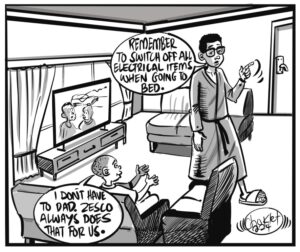FORMER Secretary to Cabinet Dr Sketchley Sacika says only independent members of parliament can claim true allegiance to the people of Zambia as regards their positions on matters debated in the National Assembly because every MP’s allegiance is to the party that sponsors them.
And Dr Sacika says National Democratic Congress (NDC) leader Chishimba Kambwili’s reasoning for not compelling member of parliament Joseph Chishala to toe the party line was not supported in the Republican Constitution.
In an interview, Dr Sacika expressed concern about Chishala’s stance on Bill 10.
Dr Sacika said Chishala and some MMD MPs who had defied the positions of their parties on Bill 10, risked losing their seats if the parties that sponsored them to Parliament decided to expel them ahead of next year’s general election.
“An MP, who is elected to Parliament on a political party ticket, represents the party that sent him to Parliament and not the people who elected him in the constituency. That is why the Constitution says that, a member of parliament who resigns from the party that sent him to Parliament or a member of parliament, who is expelled from a political party that sent him to Parliament, must vacate his seat in Parliament. The fallacy that is going on that all members of parliament represent their constituencies is an excuse, in my view, for people who want to engage in political corruption and double dealings for personal gain. It is true that they are representing constituencies, but those seats belong to the political party on whose ticket one is elected to Parliament,” Dr Sacika said.
He said the most decent thing that any MP, who disagreed with his party over any controversial issue, could do was to resign on their own accord.
“If an MP is unhappy with a position his political party has taken on an issue before Parliament, he should be principled enough to resign his seat. Voting against his own political party because he disagrees with the position the party has taken is a worst form of political treachery! In Parliament, only an independent member can claim to represent his constituency. Even then, if an independent member chooses to join a political party, the Constitution says that he must resign his seat and seek re-election. Our Constitution has been designed in such a way as to prevent political corruption and disorder and to keep our multi-party system as clean as possible,” he said.
“If we did not have restrictions, like we now have in the Constitution, there would have been chaos in Parliament where members of parliament would be resigning from their political parties to join this party and so on. That would have created confusion. So, our Constitution has been designed in this way that seats in Parliament actually belong to political parties though members of parliament are elected by constituencies.”
And Dr Sacika argued that Kambwili’s reasoning for not compelling Chishala to toe the party line was not supported by the Republican Constitution.
“Chishimba Kambwili’s reasoning that he could not force his Roan MP to act against his conscience is double talk, which is not supported by the Constitution. An MP is not a free agent and cannot conduct himself as he pleases. An MP must always, therefore, come under the whip of the party that sent him to Parliament. Members of parliament are not employees of Parliament and cannot, therefore, defy their political party on the ground that they are doing Parliamentary work. A member of parliament cannot, for instance, say that they are going to support a Parliamentary Committee as agreed upon because he was a member of that Parliamentary Committee, even though his political party does not support what that Parliamentary Committee has recommended. So, members of the MMD, whose political party doesn’t support Bill 10, but who seem to be supporting Bill 10, are actually working against their own political parties and they run the risk of being expelled from their political parties and lose their parliamentary seats in the process,” Dr Sacika observed.
He also disagreed with the notion that an MP’s first allegiance was to the people that elected them in a particular constituency.
“No, that’s totally incorrect. What matters in Parliament is what the position of the political party says. The constituencies are important, yes, but seats in Parliament don’t belong to members of parliament, they belong to the political parties and this is what the Constitution says. So, this whole thing must be understood in its proper context, but people don’t seem to understand. The talk that, ‘no, I represent my constituency’ is all rubbish! Yes, you are representing your constituency, the seat you are holding belongs to the political party that sent you to Parliament and that’s why you must resign if you are no longer a member that political party,” said Dr Sacika.













2 Responses
Sachi just RIP
This is a very clear explanation from a very wise man. Kambwili is not a very straight man. His actions regarding bill 10 and his MP are very suspicious. It’s likely that he told the new MP to side with the PF for a gain of some sort. This is shameful.